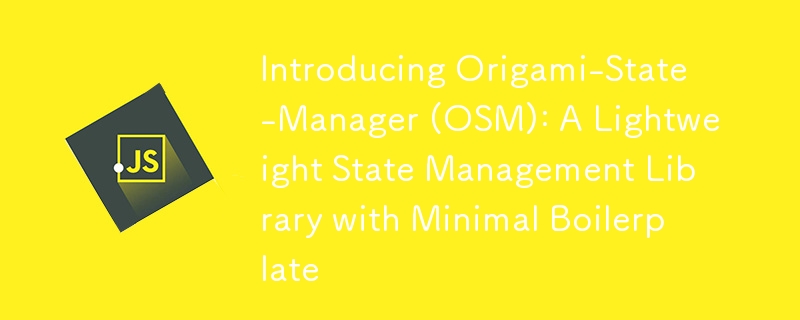

Managing global state in JavaScript applications, especially when you need it accessible across both React and non-React contexts, can be challenging. Existing libraries often involve heavy setup, unnecessary complexity, and are tightly coupled with React. But what if you could manage state with the elegance and simplicity of paper folding? Enter Origami-State-Manager (OSM).
Origami-State-Manager (OSM), pronounced "awesome," is a lightweight state management library designed to be simple, flexible, and scalable. Inspired by the Japanese art of Origami, which transforms a plain sheet of paper into intricate designs, OSM enables you to manage your application’s global state with the same elegance. Just like paper, it’s incredibly lightweight, making it perfect for applications where simplicity and performance matter.
The journey to building OSM started as a search for a solution that could:
If you’re tired of over-engineered solutions and want something that just works, OSM might be the "awesome" tool you need.
Ready to add some OSM-ness to your app? Here’s how to get started:
1. Install the Library:
npm install origami-state-manager
2. Create a Store:
A store is where all your global states live. Setting one up is as easy as passing your initial state values to createStore:
// store.ts
import { createStore } from "origami-state-manager";
const initialValues = {
origami: 0,
osmness: 0,
};
export const store = createStore(initialValues);
You can also make the store persistent by providing a store name:
export const store = createStore(initialValues, "myOSMness");
3. Access and Update State:
For React components, use the useStateListener hook to access and update state:
import { store } from "./store";
import { useStateListener } from "origami-state-manager";
function OrigamiComponent() {
const origami = useStateListener("origami", store);
return (
<button onClick={() => store["origami"].value = new Date().getSeconds()}>
Origami Count: {origami}
</button>
);
}
4. Access State in Non-React Functions:
You can easily work with state outside React as well:
// utils.js
function getProfile() {
let profile = store["profile"].value;
if (!profile) {
store["profile"].value = {};
}
return store["profile"].value;
}
OSM is perfect for scenarios where:
OSM is still in its early stages and has not been fully tested in all environments. While it’s ideal for smaller projects and straightforward state needs, it’s advisable to be cautious when using it in complex scenarios. If you do encounter any issues, please report them so the library can continue to improve.
Interested in helping make OSM even more awesome? Contributions are welcome! Check out the contribution guidelines to get started.
The changelog is regularly updated with all new changes and improvements.
Origami-State-Manager (OSM) aims to provide a simple yet powerful solution to global state management without the bloat. By keeping the setup minimal and the performance high, OSM enables you to focus on building features rather than wrestling with state complexity.
Try it out, and experience a new level of OSM-ness in your projects!
Get started with OSM today: npm: origami-state-manager
The above is the detailed content of Introducing Origami-State-Manager (OSM): A Lightweight State Management Library with Minimal Boilerplate. For more information, please follow other related articles on the PHP Chinese website!




